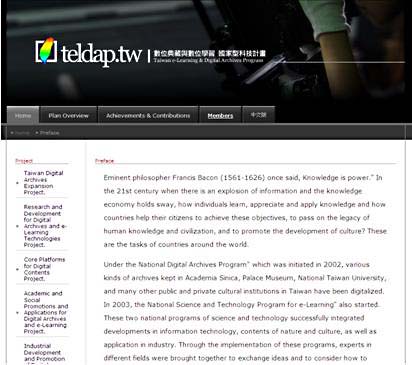Objectives
The aim of TELDAP is to make e-learning and digital archives available and accessible to the general public, moving towards the establishment of a knowledge society, with the ultimate goal of strengthening national competitiveness. The main overall objectives of TELDAP are archiving the diversity of Taiwan and deepening e-learning in Taiwan. The sub-objectives are as follows:
- To showcase the cultural, social and biological diversity of Taiwan.
- To promote the application of technologies and digital contents in cultural, academic, socio-economic and educational development.
- To establish digital archives and e-learning industries.
- To improve the use of e-learning in formal education and lifelong learning.
- To establish Taiwan as a global e-learning center for Chinese language.
- To promote international cooperation network for Chinese cultural heritage and e-learning .
Digital archives and e-learning are long-term endeavor for the development of Taiwan’s culture and information technology in the age of globalization. Based on the achievement of previous programs in preserving fine cultural assets, the next primary task of TELDAP is to emphasize indigenous cultures and showcase Taiwan’s diversity and identity. To achieve this goal of presenting Taiwan’s diversity in culture, society and natural environment, we have to start with the national digital archives, incorporate the cultural contents described by the advanced metadata, develop new technologies and find innovative applications. Accordingly, TELDAP will thoroughly promote both the contents and the technology of digital archives and e-learning and apply them to industries, education, research and social development. Through the joint efforts of the professional team of TELDAP in cooperation with sustainable business models of operation, it is our hope that we can bring Taiwan’s rich digital content to the global stage.
As for the strategy of industrial development for TELDAP, in the midst of the time when the first generation products are mature, while the second generation products are in the value creation phase, it is hoped that Web 2.0 (the idea of users’ contribution) technology can be used as the main vehicle to turn e-learning activities into a platform for collective intelligence sharing, integrated services for personalized learning and social computing. TELDAP will adopt knowledge- and learner-centered approaches, to evaluate e-learning projects in terms of their practicality and business performance. Concerning the creation of e-learning culture, TELDAP encourages sharing of learning resources and will promote collective marketing to expand the scale of e-learning and digital content industry and the range of applications. As for professional training, TELDAP will hold relevant training workshops with the help of the government, encouraging as many people as possible to learn new knowledge, acquire new skills and improve cultural literacy through e-learning. Various tools for learning and evaluation will be considered, such as instant learning, instant evaluation, learning coupons, and learning passports. For the Chinese language e-learning program, TELDAP will collect information about Chinese language learners from various backgrounds as well as their learning curves with the help of the government, academia and relevant industries. Such information will be extremely useful for the production of learning materials and Chinese language teaching course design. Our professional training projects will enable teachers not only to teach but also to edit teaching materials. TELDAP will also create platforms for both teachers and authors of learning materials to promote the development of Chinese language e-learning.
It is hoped that TELDAP will succeed in contributing tremendously to the development of all the main aspects of our information society, promoting Taiwan’s cultural identity based on its rich culture, and helping Taiwan to catch up with the advanced Western countries in the era of digital globalization and the knowledge society. Also, with our advanced digital archives and e-learning technologies and the international network we will conduct a series of international cooperation projects in scientific research, education and industrial applications. These international projects will help Taiwan develop flexible connections with other countries, through relationships that are equal, reciprocal, cooperative and dynamic. In the end, we aim to achieve the ultimate goal of increasing Taiwan’s national competitiveness in the global market.

Portal to Taiwan e-Learning and Digital Archives Program http://teldap.tw